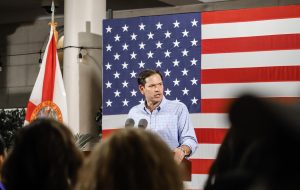The election of Donald Trump to the U.S. presidency has raised concerns among many who care about human rights and democracy in China and around the world. As Freedom House has documented, the returning president has a record of antidemocratic and anti-human rights behavior and rhetoric, and his first administration featured a mixture of gains and missteps in its China policy. On the campaign trail, Trump indicated a hardline stance toward Beijing regarding economic issues in particular, but referred often to his “very strong relationship” with Chinese leader Xi Jinping, leaving observers unsure of how events might play out over the next four years.
Given this lack of clarity, Trump’s recent selection of Senator Marco Rubio of Florida as his nominee for U.S. secretary of state has instilled some confidence in pro-democracy communities in China and the diaspora, as Rubio is known for his strong objections to Beijing’s human rights abuses.
Rubio once served as a co-chair of the U.S. Congressional-Executive Commission on China (CECC), an independent agency that monitors human rights and the rule of law in China, and he has long been one of the fiercest critics of the Chinese Communist Party (CCP) in Congress. His consistent advocacy for freedom in China stems from his belief that the global threat posed by the CCP regime is not just a matter of economic competition, but also a challenge to the survival of democratic norms.
In a 2022 speech, Rubio warned that the history of the 21st century would either be “a story of how a rising authoritarian power replaced a free society as the world’s most powerful country” or “the story of how the people of the United States, the freest, most prosperous and successful nation in the history of the world… rallied around the truth the country was founded on and ushered in a century of liberty and justice.” In 2020, Beijing sanctioned Rubio and five other legislators in retaliation for the imposition of U.S. sanctions on Hong Kong officials who had restricted fundamental rights in the territory.
In some ways, the first Trump administration’s record on human rights in China was in line with Rubio’s views. For example, responding to what U.S. officials determined to be genocide against ethnic and religious minority groups in Xinjiang, the U.S. government slapped sanctions on senior Chinese officials and blacklisted major Chinese companies for their complicity in surveillance and forced labor in the region. In the wake of the CCP’s dramatic crackdown on freedoms in Hong Kong, the Trump administration revoked Hong Kong’s preferential economic status and sanctioned officials from both Hong Kong and the mainland. Trump also signed into law the Uyghur Human Rights Policy Act and the Hong Kong Human Rights and Democracy Act, both of which had been sponsored by Rubio.
Other Trump-era polices were more problematic. The China Initiative, launched in 2018 by the Department of Justice to prosecute economic espionage and intellectual property theft, was widely criticized for causing ruinous financial and reputational harms to wrongfully targeted individuals, stoking suspicion against scholars of Chinese origin, and contributing to a climate of fear among academics with legitimate working ties to Chinese institutions. And despite its overall support for Uyghurs suffering persecution in Xinjiang, the Trump administration did not accept any Uyghurs through its refugee resettlement program or prioritize reviews of their asylum cases, leaving many at risk of being repatriated to China or stuck in the ponderous U.S. asylum system.
Trump himself has made a slew of deeply troubling comments. In 2018, he told a gathering of Republican Party donors that Xi being president for life “sounds good,” adding “maybe we’ll give that a shot someday.” During a meeting with Xi in 2019, he allegedly encouraged the construction of detention camps in Xinjiang. In a campaign interview this year, he praised Xi for being “a brilliant guy,” explaining that he “controls 1.4 billion people with an iron fist.” Trump has also repeatedly called COVID-19 “the Chinese virus,” which studies show contributed to the rise of anti-Asian racism online.
Rubio, if confirmed by the Senate, and others who will serve in the new administration should resume the first Trump administration’s strong policies on human rights in China while working to avoid past mistakes. One of Rubio’s first actions as secretary of state should be to press for the immediate release of political prisoners in China and Hong Kong, in part by imposing sanctions on officials responsible for human rights violations in both locations. He should also ensure that the provisions of the Uyghur Human Rights Policy Act are fully enforced and that the U.S. government continues to support civil society groups and human rights defenders in China.
It will be equally important for Rubio to vigorously counter any harmful rhetoric that makes light of autocracy or conflates the CCP with the Chinese people more broadly. As the world’s most influential democracy, the United States has a unique ability to appeal directly to Chinese citizens and champion their enduring desire for freedom. It should never squander this great competitive advantage against Beijing by neglecting democratic principles or blurring the distinction between a rigid authoritarian regime and the people it oppresses.

































